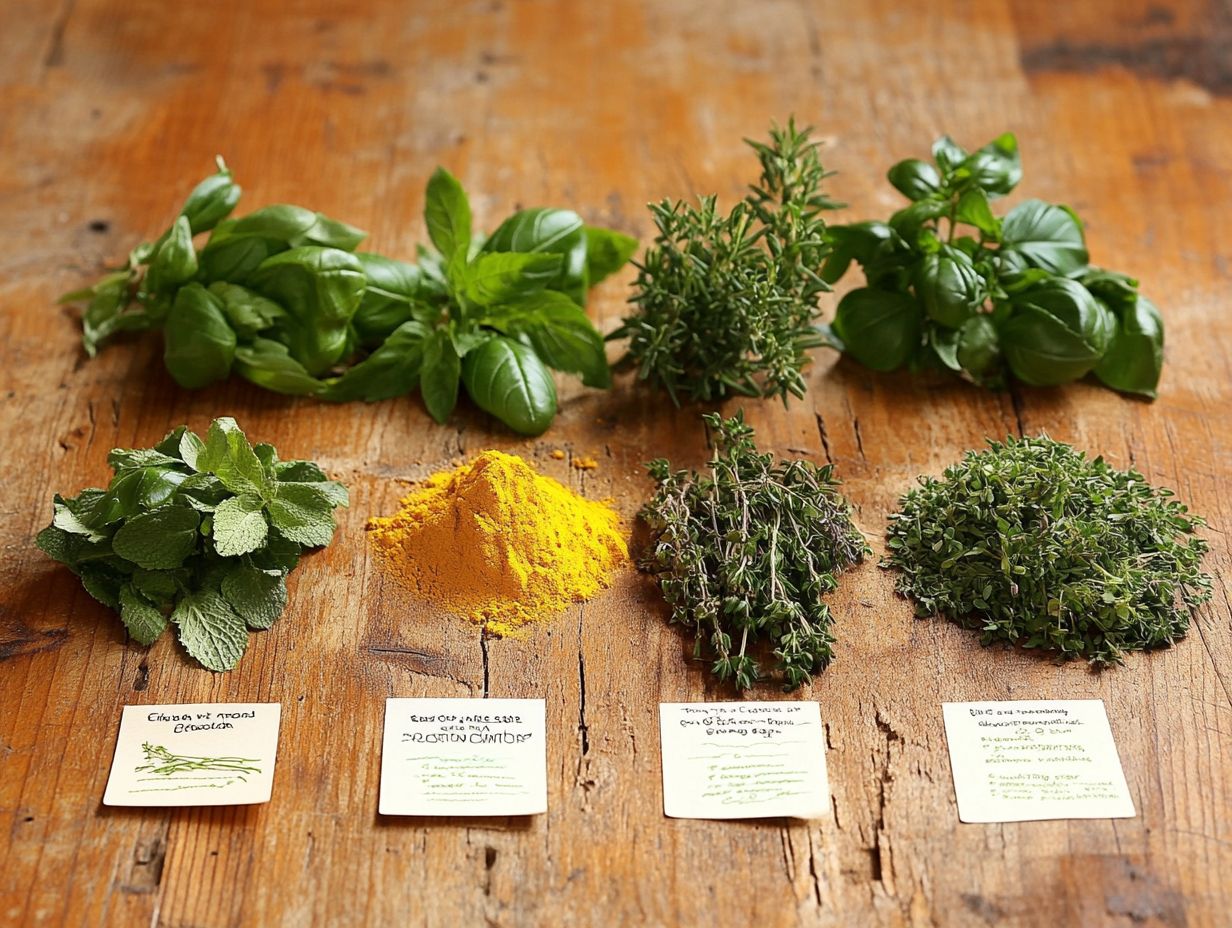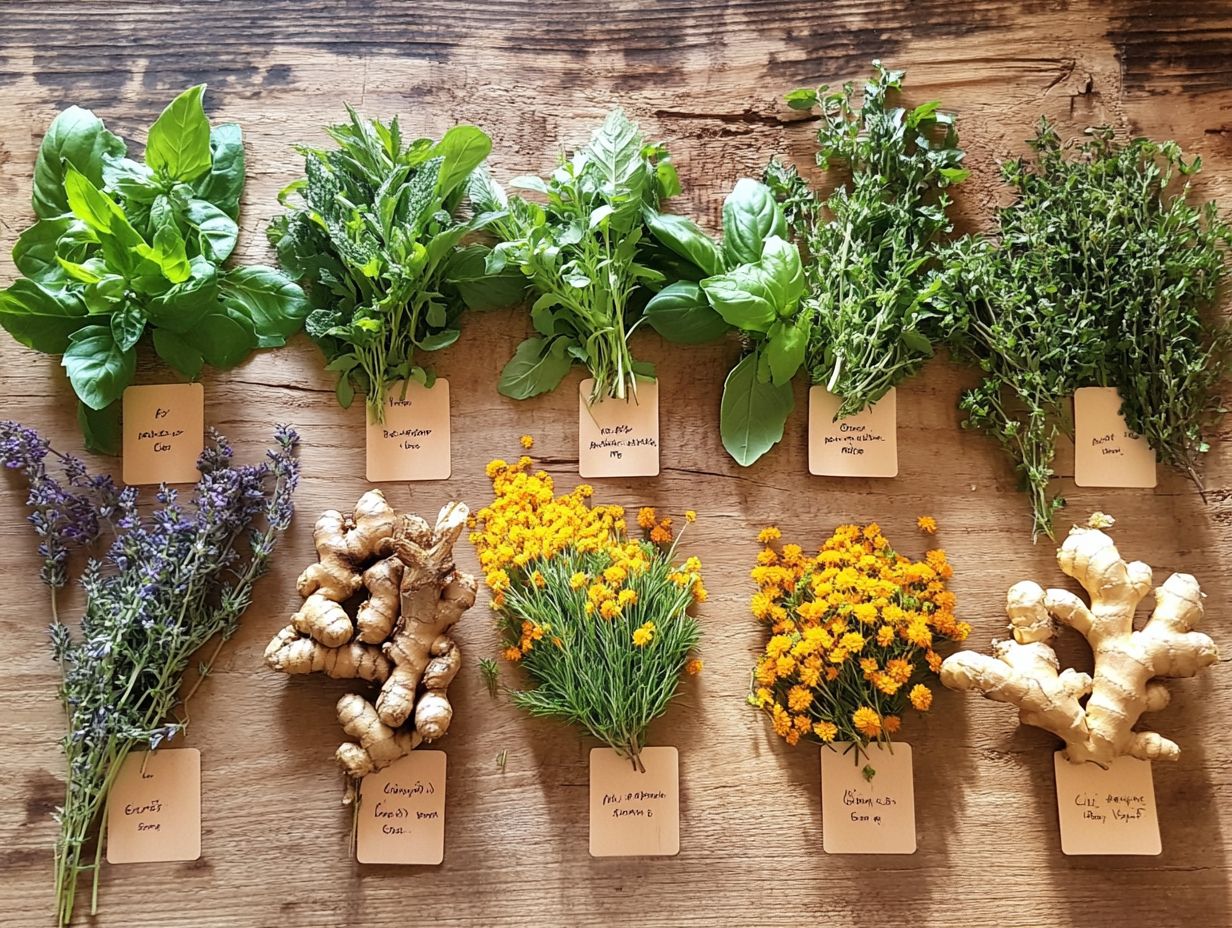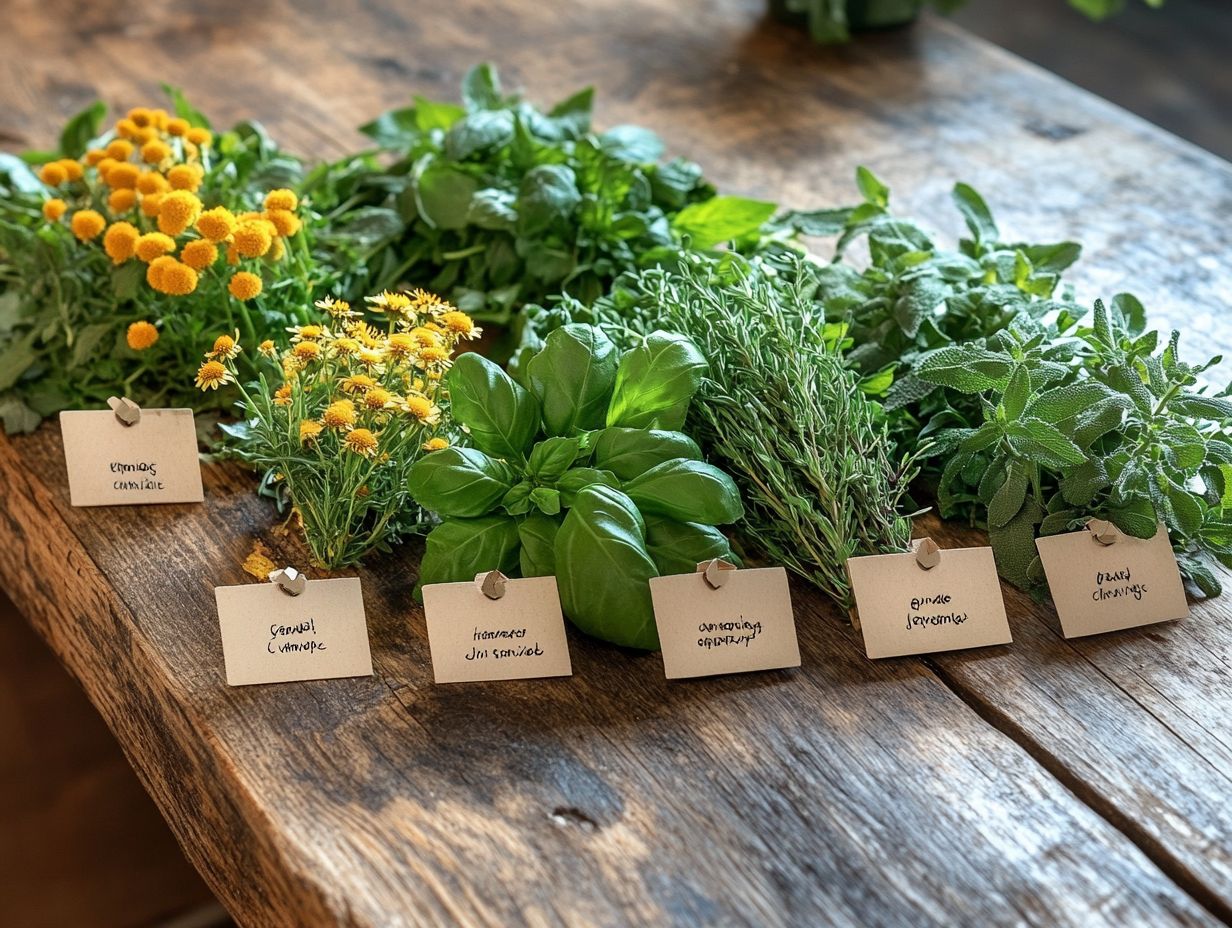7 Herbs Used in Naturopathy for Healing
In the realm of holistic health, naturopathy stands out as a guiding light for natural healing, weaving together the rich tapestry of herbs to enhance your well-being.
This article delves into seven potent herbs turmeric, ginger, garlic, holy basil, ashwagandha, aloe vera, and neem that have long been revered for their therapeutic benefits.
You ll uncover how these botanicals are integrated into naturopathic practices, the principles that underpin their usage, and the potential advantages and side effects to consider.
You will also discover practical tips for seamlessly incorporating these herbs into your daily routine, along with insights on how to cultivate them right in your own home.
Start your exciting journey to natural healing today!
Contents
- Key Takeaways:
- 1. Turmeric
- 2. Ginger
- 3. Garlic
- 4. Holy Basil
- 5. Ashwagandha
- 6. Aloe Vera
- 7. Neem
- What Is Naturopathy and How Does It Use Herbs for Healing?
- What Are the Key Principles of Naturopathy?
- How Are Herbs Used in Naturopathy for Healing?
- What Are the Benefits of Using Herbs in Naturopathy?
- What Are the Possible Side Effects of Using Herbs in Naturopathy?
- How Can One Incorporate Herbs into Their Naturopathic Treatment?
- What Are the Common Herbs Used in Naturopathy for Healing?
- How Can One Grow and Use These Herbs at Home?
- Frequently Asked Questions
- What are the 7 herbs commonly used in naturopathy for healing?
- How does ginger promote healing in naturopathy?
- What are the benefits of using turmeric in naturopathy for healing?
- How is garlic used in naturopathy for healing?
- Can cayenne pepper be helpful in naturopathy for healing?
- How does aloe vera aid in healing in naturopathy?
- What are the potential benefits of using cinnamon in naturopathy for healing?
- In what ways can chamomile be used for healing in naturopathy?
Key Takeaways:

- Turmeric: Reduces swelling and pain, beneficial for arthritis and digestive issues.
- Ginger: Aids digestion and alleviates nausea, known for its antioxidant effects.
- Garlic: Offers antibacterial and antiviral benefits, boosts the immune system.
1. Turmeric
Turmeric, that vibrant yellow herb, isn t just a culinary star; it s also celebrated for its remarkable health benefits. It reduces inflammation and enhances antioxidant properties, boasting a wide array of medicinal uses recognized in both traditional Ayurvedic and modern herbal practices.
This ancient spice derives its potency from curcumin, its primary active ingredient, which has garnered attention in numerous studies for its potential to alleviate conditions such as arthritis, heart disease, and even specific cancers.
Research featured in reputable journals like the Journal of Medicinal Food underscores curcumin’s ability to inhibit cancer cell invasion and metastasis. Many individuals report that regular consumption brings relief from chronic pain and digestive issues.
In Ayurvedic traditions, turmeric is revered for purifying qualities, often incorporated into treatments aimed at enhancing overall wellness by balancing bodily energies. This positions turmeric not merely as a remedy but as an essential component of holistic health.
2. Ginger
Ginger, that remarkable root with its distinctive flavor, isn t just a culinary staple; it s also an herbal supplement known for its impressive array of health benefits. From pain relief to aiding gastrointestinal disorders and reducing stress, ginger proves to be versatile in herbal remedies and dietary supplements.
The ginger root s anti-inflammatory and antioxidant properties enhance its effectiveness in tackling various ailments. Traditionally, it has been used to alleviate nausea, especially for pregnant women and individuals undergoing chemotherapy. Modern research backs its role in improving digestion and soothing an upset stomach.
You might find ginger s calming effects particularly appealing as a natural ally against anxiety, offering a holistic approach to stress relief. Whether you enjoy it as a soothing tea, in supplement form, or as a flavorful ingredient in your meals, the diverse applications of this adaptogenic herb highlight its significance in holistic health practices.
3. Garlic
Garlic, often hailed as a superfood, offers an impressive array of health benefits that you simply can’t overlook. Its antimicrobial properties and significant contributions to cardiovascular health make it an essential herb in any dietary plan aimed at improving overall wellness.
But its medicinal virtues go far beyond the usual recognition. Garlic plays a vital role in boosting your immune system, thanks to compounds like allicin, which provide protective effects against infections. Its ability to regulate blood pressure and lower cholesterol emphasizes its importance in traditional medicine practices.
Historically, garlic has been a go-to natural remedy for warding off ailments, making its presence in your health-conscious diet not only beneficial but also a delightful nod to ancient wellness traditions.
Incorporating garlic into your meals enhances not just flavor but also your overall health, contributing to a more holistic approach to nutrition.
4. Holy Basil
Holy Basil, or Tulsi, is a cherished herb in Ayurvedic medicine, known for its remarkable health benefits. It helps reduce stress and provides anxiety relief, making it one of the best herbs for stress relief and overall well-being.
This plant has a long history, revered for thousands of years in various spiritual rituals and healing practices. It calms your mind and supports your immune system, making it invaluable against chronic fatigue and illness.
Many individuals embrace Holy Basil for its potential to uplift mood and enhance energy levels. By incorporating this ancient remedy into your daily routine, you can unlock its stress-relieving properties and move toward a healthier, more balanced life.
5. Ashwagandha
Ashwagandha is a cornerstone of Ayurvedic medicine, well-known for its extensive health benefits. It boosts testosterone levels, relieves anxiety, and enhances vitality, establishing itself as one of the best stress-relieving herbs.
In our fast-paced world, where stress and anxiety are common, this extraordinary herb offers natural relief. Research shows it can lower cortisol levels, helping to alleviate stress and elevate mood.
For instance, a study published in the Journal of Clinical Psychology revealed that participants who added ashwagandha to their routine experienced a significant drop in stress and anxiety symptoms.
Its effect on hormonal balance is significant, with findings indicating that ashwagandha can help regulate thyroid function. This makes it a valuable ally for anyone facing modern health challenges.
6. Aloe Vera

Aloe Vera, with its soothing gel, offers numerous health benefits, especially for wound healing and gastrointestinal disorders. It’s no surprise it has become a go-to natural remedy for skin and digestive health!
This remarkable plant is known for its ability to speed up skin repair and its impressive antioxidant content, which helps combat oxidative stress.
When applied topically, Aloe Vera’s anti-inflammatory properties alleviate sunburn and minor cuts while forming a protective barrier that promotes faster healing.
Internally, it acts as a gentle laxative and is widely recognized for soothing upset stomachs while keeping your body hydrated. These versatile uses contribute significantly to overall wellness, reinforcing Aloe Vera s status as a staple in home remedies and professional health practices.
7. Neem
Neem, often called the ‘village pharmacy’ in traditional Indian medicine, is celebrated for its extraordinary health benefits. Its potent antimicrobial properties make it a go-to natural remedy for various skin conditions and promote overall well-being.
But Neem isn’t just about skincare! It’s also essential for dental health. Its leaves and twigs have been used for ages to freshen breath and tackle oral infections. Beyond beauty and hygiene, Neem supports immune health and is often found in herbal blends designed to enhance your body’s defenses.
As modern natural remedies embrace Neem for its versatility, its historical significance in herbal practices highlights its valued role in holistic wellness. The blend of ancient wisdom and contemporary science continues to reveal more of Neem’s incredible potential.
What Is Naturopathy and How Does It Use Herbs for Healing?
Naturopathy offers a holistic approach to healthcare that champions the use of natural remedies, particularly healing herbs, to tackle health conditions, enhance your overall well-being, and promote your body s innate ability to heal itself. This makes it a vital facet of modern herbal medicine.
Grounded in ancient traditions and informed by contemporary scientific understanding, naturopathy recognizes that your mind, body, and spirit are all connected. Practitioners treat you as a whole person. This allows them to tailor their treatments to your specific needs, fostering emotional well-being alongside physical health.
Practitioners often weave together various healing modalities, including nutrition, lifestyle counseling, and physical therapies. However, herbal medicine remains a foundational element of their practice.
By tapping into the wealth of plant-based remedies, these practitioners aim to harness therapeutic properties that can alleviate ailments, boost your immunity, and restore balance within your body. This approach exemplifies the remarkable power of nature in promoting health and vitality.
What Are the Key Principles of Naturopathy?
The key principles of naturopathy center around a holistic approach to health that prioritizes prevention, honors your body s innate healing abilities, and embraces natural remedies especially healing herbs to enhance your overall wellness.
This methodology acknowledges that you are a complex being, where physical, emotional, and environmental factors intricately influence your health. By treating you as a whole person, naturopathic practitioners can customize their interventions to meet your specific needs.
For instance, if you’re grappling with anxiety, you might find relief not just through herbal supplements like chamomile, but also through stress-reduction techniques such as yoga and mindfulness.
This comprehensive strategy gives you the power to take an active role in your healing journey, encouraging lifestyle changes that resonate with your unique constitution while honoring your body s remarkable ability to heal itself.
How Are Herbs Used in Naturopathy for Healing?
Healing herbs come in many exciting forms that can transform your wellness journey! In naturopathy, you’ll find that these herbs are utilized in a variety of ways to promote wellness and tackle a range of health conditions, highlighting the role of herbal medicine in naturopathy as a fundamental aspect of natural remedies.
Consider herbal teas, for instance these infused blends offer soothing properties, with chamomile providing relaxation and peppermint supporting digestive health.
Then there are tinctures. Tinctures are strong liquid extracts made by soaking herbs in alcohol or vinegar, making them easy to use. Echinacea is a notable choice here, often employed to enhance the immune system.
If convenience is what you seek, capsules present a precise alternative, delivering beneficial herbs like ashwagandha, renowned for its stress-relief properties.
Each method brings its unique advantages, making them versatile allies in your pursuit of holistic healing and well-being.
What Are the Benefits of Using Herbs in Naturopathy?
Utilizing herbs in naturopathy offers you a wealth of benefits, enhancing your health through natural remedies and promoting healing. Consider exploring 7 ways to incorporate naturopathy into daily life to support your body’s inherent ability to recover from various health conditions.
These plant-based solutions offer a gentler alternative to conventional medications, alleviating symptoms with fewer side effects, which is particularly appealing if you’re concerned about medication interactions.
For instance, turmeric is celebrated for its anti-inflammatory properties, offering relief for conditions like arthritis without the gastrointestinal discomfort that often accompanies over-the-counter pain relievers. Similarly, valerian root is a popular choice for promoting restful sleep, perfect for those grappling with insomnia while steering clear of the grogginess that can come with sleeping pills.
By targeting specific health concerns such as digestive issues or anxiety, these natural therapies allow you to craft a more personalized approach to wellness, enhancing both your physical and mental vitality.
Explore the incredible benefits of naturopathy and consider consulting a naturopathic practitioner to discover how herbal medicine can enhance your health and well-being!
What Are the Possible Side Effects of Using Herbs in Naturopathy?

Herbs bring a wealth of health benefits in naturopathy. However, they can also have potential side effects, especially when misused or overused.
This underscores the necessity of understanding their medicinal properties and how they might interact with existing health conditions.
Take St. John’s wort, for instance; it can interfere with prescription medications. Valerian root might cause drowsiness or upset your digestive system.
Being well-informed about these reactions is crucial when considering herbal remedies.
By consulting a healthcare professional who specializes in herbal medicine, you can navigate the complexities of incorporating herbs into your treatment plan safely. This proactive approach helps maximize the health benefits of herbs while minimizing risks, ultimately fostering a balanced and informed perspective on holistic health practices.
How Can One Incorporate Herbs into Their Naturopathic Treatment?
Incorporating herbs into your naturopathic treatment plan is seamless, with various methods at your disposal. Whether through dietary recommendations, soothing teas, tinctures, or topical applications, you can effectively explore the benefits of natural remedies.
To elevate your daily wellness, consider adding cooking herbs like basil or rosemary to your meals. They enhance flavor and offer numerous health benefits.
Sipping herbal teas made from chamomile or peppermint is another delightful way to weave these natural elements into your routine, promoting relaxation and aiding digestion.
If supplements are more your style, it s smart to consult a healthcare professional to ensure the herbs you choose align with your health needs. Remember, everyone s body is unique; crafting a customized approach allows you to integrate these powerful botanicals effectively.
What Are the Common Herbs Used in Naturopathy for Healing?
Common herbs in naturopathy, such as Ashwagandha, Ginger, Turmeric, and Garlic, are celebrated for their remarkable health benefits and roles in herbal medicine. Exploring these naturopathic herbs for immune support highlights the immense potential of healing herbs in promoting your wellness.
Dating back centuries, these herbs have been embraced by diverse cultures, each carrying a rich tapestry of knowledge and tradition.
Ashwagandha, often dubbed Indian ginseng, is renowned for its ability to help your body manage stress. It enhances overall vitality.
Ginger is not only cherished for its cooking flexibility, but it is also admired for its capacity to reduce inflammation and support digestion.
Turmeric, with its celebrated compound curcumin, offers powerful anti-inflammatory and antioxidant effects. It is a favorite in herbal remedies.
Garlic is not just a flavor enhancer; it is also a potent ally for boosting your immune system and promoting cardiovascular health.
Collectively, these herbs form the foundation of naturopathic practices, embodying the belief that nature holds the key to your holistic healing journey, as highlighted in life-changing naturopathic remedies.
How Can One Grow and Use These Herbs at Home?
Imagine growing your own herbs! It can be an incredibly rewarding endeavor, allowing you to cultivate natural remedies and ensuring fresh access to potent herbal medicine.
This practice promotes a sustainable lifestyle and connects you with nature, offering a therapeutic gardening experience.
To achieve optimal growth, select the right soil ideally, a well-draining mix rich in organic matter whether planting indoors or outdoors. Most herbs thrive in areas that receive at least six hours of direct sunlight each day.
Regular watering is key, but avoid over-saturation for healthy herbs. When it s time to harvest, snip the leaves during the flowering stage to maximize flavor and potency.
This ensures they are perfect for culinary uses or invigorating herbal teas that can truly uplift your daily routine.
Frequently Asked Questions
What are the 7 herbs commonly used in naturopathy for healing?
The seven herbs used in naturopathy include ginger, turmeric, garlic, cayenne pepper, aloe vera, cinnamon, and chamomile, which you can explore further in the top 7 naturopathic remedies for common ailments.
How does ginger promote healing in naturopathy?

Ginger reduces inflammation and pain in the body. It also eases digestion and helps with nausea.
What are the benefits of using turmeric in naturopathy for healing?
Turmeric is a superstar in healing! It fights inflammation and boosts your body s defenses.
How is garlic used in naturopathy for healing?
Garlic is a natural antibiotic that fights infections and supercharges your immune system. It also lowers cholesterol and reduces inflammation.
Can cayenne pepper be helpful in naturopathy for healing?
Cayenne pepper relieves pain, making it beneficial for arthritis and headaches. Plus, it has antibacterial and anti-inflammatory effects.
How does aloe vera aid in healing in naturopathy?
Aloe vera soothes and reduces inflammation, making it great for burns and eczema. It also boosts digestion and supports the immune system.
What are the potential benefits of using cinnamon in naturopathy for healing?
Cinnamon is packed with antioxidants and helps lower blood sugar and cholesterol levels. It may even have anti-cancer effects!
In what ways can chamomile be used for healing in naturopathy?
Chamomile calms and reduces inflammation, helping with anxiety and insomnia. You can also use it on skin irritations and wounds.






